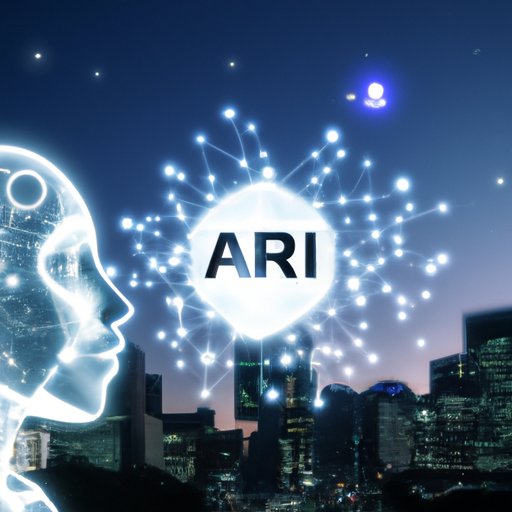Introduction
Artificial intelligence (AI) is the ability of a computer to imitate human behavior and solve problems autonomously. AI has become increasingly pervasive in our lives, from voice assistants like Alexa to autonomous cars. AI is used in various industries, from healthcare to finance, to improve efficiency and accuracy in decision-making. This article examines the benefits and applications of AI, common AI technologies and algorithms, future trends, challenges, and ethical considerations.

Benefits and Applications of AI
AI offers many potential benefits for businesses and individuals. AI can be used to improve efficiency and productivity, automate repetitive tasks, and enhance decision-making capabilities. In addition, AI can be used to increase accuracy in predictive analysis, which can be beneficial in fields such as healthcare, finance, and marketing.
AI is being used in many different industries, including healthcare, finance, retail, manufacturing, and transportation. In healthcare, AI is being used to diagnose diseases, detect anomalies in medical images, and provide personalized treatment plans. In finance, AI is being used to develop more accurate financial models, detect fraud and money laundering, and improve customer service. In retail, AI is being used to personalize customer experiences, optimize inventory management, and improve supply chain efficiency. In manufacturing, AI is being used to automate production processes, monitor quality control, and predict maintenance needs. In transportation, AI is being used to optimize route planning, identify traffic patterns, and manage autonomous vehicles.
Common AI Technologies and Algorithms
AI technologies and algorithms are the foundation of any AI system. Common AI technologies and algorithms include machine learning, natural language processing, and computer vision. Machine learning algorithms are used to teach computers to recognize patterns and make decisions without explicit programming. Natural language processing enables computers to understand, process, and generate human language. Computer vision algorithms allow computers to analyze and interpret images and videos.
In addition, AI systems use a variety of other algorithms, such as reinforcement learning, deep learning, and evolutionary algorithms. Reinforcement learning algorithms enable AI systems to learn by trial and error. Deep learning algorithms are used to create neural networks that can simulate human reasoning. Evolutionary algorithms are used to optimize AI systems to find the best possible solution to a given problem.
Future Trends in AI
As AI continues to evolve, new applications and use cases are emerging. Autonomous vehicles are becoming increasingly commonplace, with companies like Tesla and Google leading the way. Robotics are being used in a variety of industries, from manufacturing to healthcare. Smart homes are becoming more popular, with devices like Amazon Echo and Google Home providing hands-free control of appliances and home security. Virtual assistants are becoming increasingly sophisticated, with services like Siri and Cortana providing personalized assistance.
Challenges of AI Development
Despite the many potential benefits of AI, there are still some challenges associated with its development. One of the biggest challenges is data availability. AI systems need large amounts of data to train and improve their performance, but this data can often be difficult to access or expensive to purchase. Another challenge is security concerns, as AI systems can be vulnerable to malicious attacks. Finally, the cost of implementation can be a major barrier for many organizations.

Impact of AI on Society
The impact of AI on society is significant. AI can be used to create jobs and increase economic growth, as well as improve access to education and healthcare. However, it can also have negative implications, such as increased social inequality and privacy concerns.
AI can be used to create new types of jobs, such as data scientists and AI engineers. It can also help boost economic growth by increasing productivity and reducing costs. AI can also be used to improve access to education and healthcare, by helping to diagnose diseases and provide personalized treatments. On the other hand, AI can have negative implications, such as creating job displacement and increasing social inequality.
Ethical Considerations Surrounding AI
As AI becomes increasingly pervasive in our lives, ethical considerations must be taken into account. Issues such as privacy protection, autonomy, and accountability must be addressed in order to ensure that AI systems are used responsibly. For example, AI systems must be designed to protect the privacy of users and respect their autonomy. Additionally, AI systems must be held accountable for their decisions and actions.
Conclusion
This article explored the concept of artificial intelligence (AI) and provided examples of its application in various industries. It examined the benefits and applications of AI, common AI technologies and algorithms, future trends, challenges, and ethical considerations. AI has the potential to revolutionize many industries, from healthcare to finance, but it also presents some challenges and ethical considerations that must be addressed. Ultimately, AI can be an invaluable tool if used responsibly and ethically.
(Note: Is this article not meeting your expectations? Do you have knowledge or insights to share? Unlock new opportunities and expand your reach by joining our authors team. Click Registration to join us and share your expertise with our readers.)
